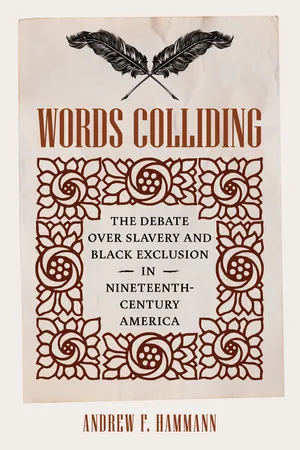
Words Colliding
The Debate over Slavery and Black Exclusion in Nineteenth-Century America
- English
- ePUB (mobile friendly)
- Available on iOS & Android
Words Colliding
The Debate over Slavery and Black Exclusion in Nineteenth-Century America
About this book
The long history and lasting impact of the rhetoric of Black exclusion in American politics and culture
In 1787, Thomas Jefferson declared that the United States was destined to become a nation free of slavery—and of its entire Black population. Following his cue, Henry Clay and other prominent politicians founded the American Colonization Society in 1816, launching the Black expatriation ("colonization") movement, a political force that, over the next eighty years, promoted the removal, with federal support, of the nation's Black population. Throughout this time, the vast majority of Black Americans, Frederick Douglass among them, opposed this movement with great vigor and conviction, characterizing it as one of their greatest enemies, second only to slavery itself.
Words Colliding offers the fullest account to date of this political debate, highlighting its dramatic impact on the national conversations regarding slavery and Black civil rights. From the beginning, Black Americans expressed grave concern that the rhetoric of colonization framed Black freedom as a national problem. Throughout the nineteenth century, even after the Civil War and through the Jim Crow era, they argued that the colonization movement, no matter its professed aim, functioned mainly to encourage and justify racial oppression in America.
Tools to learn more effectively

Saving Books

Keyword Search

Annotating Text

Listen to it instead
Information
Table of contents
- Cover
- Title Page
- Copyright Page
- Dedication
- Contents
- Acknowledgments
- Introduction
- 1 Founding Moment: Decoding the Rhetoric
- 2 Ending Slavery: 1817–1833
- 3 Strengthening the Union: 1833–1853
- 4 Preventing Disunion: 1854–1860
- 5 Ending the Civil War: 1861–1865
- 6 Opposing Black Suffrage: 1866–1900
- Conclusion
- Notes
- Bibliography
- Index
Frequently asked questions
- Essential is ideal for learners and professionals who enjoy exploring a wide range of subjects. Access the Essential Library with 800,000+ trusted titles and best-sellers across business, personal growth, and the humanities. Includes unlimited reading time and Standard Read Aloud voice.
- Complete: Perfect for advanced learners and researchers needing full, unrestricted access. Unlock 1.4M+ books across hundreds of subjects, including academic and specialized titles. The Complete Plan also includes advanced features like Premium Read Aloud and Research Assistant.
Please note we cannot support devices running on iOS 13 and Android 7 or earlier. Learn more about using the app